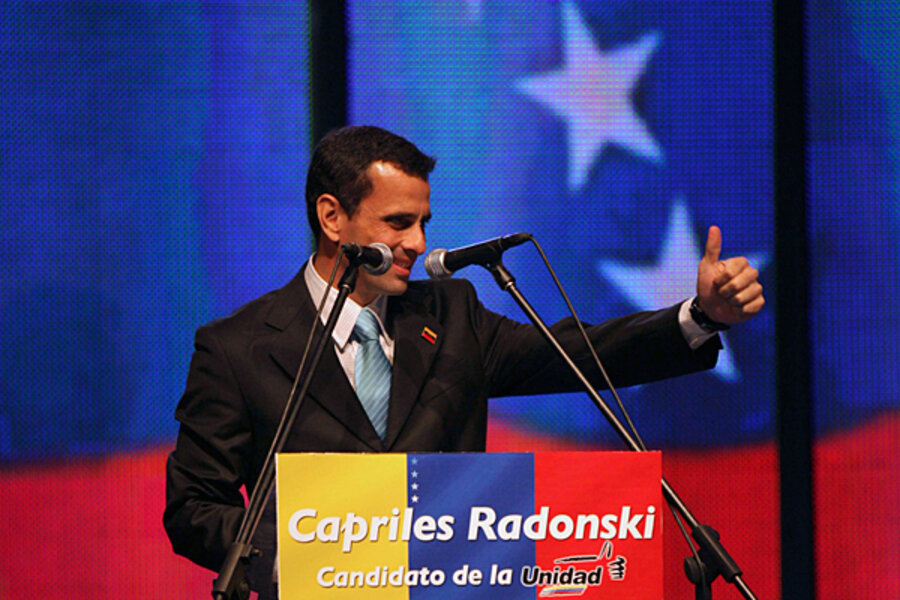Security could be weakness for Venezuela opposition
Loading...
• A version of this post ran on the author's site, insightcrime.org. The views expressed are the author's own.
Citizen security is sure to be a key issue in the upcoming October presidential elections in Venezuela, but while the opposition will likely challenge President Hugo Chavez’s crime policies, their candidate’s record isn’t much better.
Venezuela’s Coalition for Democratic Unity (MUD) held their first-ever presidential primary Sunday, with Henrique Capriles Radonski beating his four opponents in a landslide, taking 62 percent of the vote. Capriles, governor of Miranda state, is now gearing up for an eight month assault on Chavez in the lead up to the Oct. 7 elections. One of the hot-button issues over which the two are likely to square off is crime prevention. Venezuela saw a record number of homicides in 2011, and the level of kidnappings (in Spanish) and robberies has surged in recent years.
Like other leading figures in the MUD, Capriles has repeatedly criticized Chavez for the state of crime in Venezuela. Rather than endorsing a "hardline" solution to insecurity in the country, however, he has proposed more social remedies. He has expressed an interest in making Venezuela’s notoriously crowded prisons more humane (in Spanish), saying “the most important human rights violations occur in the prisons run by the government.” Education is the hallmark policy (in Spanish) of his campaign, and he has referred to it as “the long-term solution to our crime phenomenon.”
But while Capriles has gained significant praise for his work on education as governor of Miranda, his security achievements in the state have been lacking. According to Venezuela’s Corps of Scientific, Penal, and Criminal Investigations’ (CICPC) homicide figures for 2011 (in Spanish), Miranda has not been spared the country’s rapidly rising homicide rate. While the number of murders is less than Caracas (which saw 3,488), the 2,138 homicides that took place in Miranda last year make it one of the most violent states in Venezuela.
So far, 2012 has not been an exception. Last week Venezuelan Interior Minister Tareck El Aissami released the official homicide figures for the past month (in Spanish), which suggest Miranda saw more murders than any other state in the country in January. The 231 homicides in the state last month represent a 16 percent increase from the tally of murders in January 2011.
Capriles has said that violence has worsened in some parts of the country because the Chavez administration has cut funding to regional governments led by opposition politicians, gutting their ability to fund police forces. The government has denied this, however, saying that Capriles has not requested any federal funds (in Spanish) for the state police. El Aissami has claimed that this represents a “complete abandonment of [Capriles’] responsibilities,” and proves that the governor is hypocritical in criticizing insecurity in the country.
The Chavez government is not alone in criticizing the rate of crime in Miranda. Two years after Capriles took office in 2008, the non-governmental organization, the Venezuelan Observatory of Violence (OVV) released a report condemning not only the high level of murders in the state, but also the lack of investigation into homicide cases (in Spanish). According to the OVV, most homicides in the state are met with impunity, and 93 percent of murder cases in the state lack even a single suspect.
Capriles’ lackluster record on crime in his own state, as well as the ferocity of the government’s counter-attacks, may prove to be a major flaw for the Miranda governor in the coming months. Indeed, this weakness could partially explain why one of his MUD rivals, former Chacao Mayor Leopoldo Lopez, dropped out of the primary race in January to support Capriles’ campaign. After his own campaign was marred by corruption allegations, Lopez was unlikely to win. Now that he is on the Capriles team he can lend his own, considerably better, security reputation to the campaign. Though it is located in Miranda, Chacao became safer under Lopez’s watch (in Spanish).
So far, however, neither Lopez nor Capriles has released a detailed proposal to combat insecurity, a key issue for Venezuelans. According to public opinion polling project Latinobarometro (in Spanish), the majority of Venezuelans (61 percent) rate “crime/public security” as the most pressing issue facing their country. Unless his campaign comes up with a more specific policy prescription for crime which dramatically breaks with Chavez’s, he will have trouble convincing the electorate that he’ll do any better.
– Geoffrey Ramsey is a writer for Insight – Organized Crime in the Americas, which provides research, analysis, and investigation of the criminal world throughout the region. Find all of his research here.





